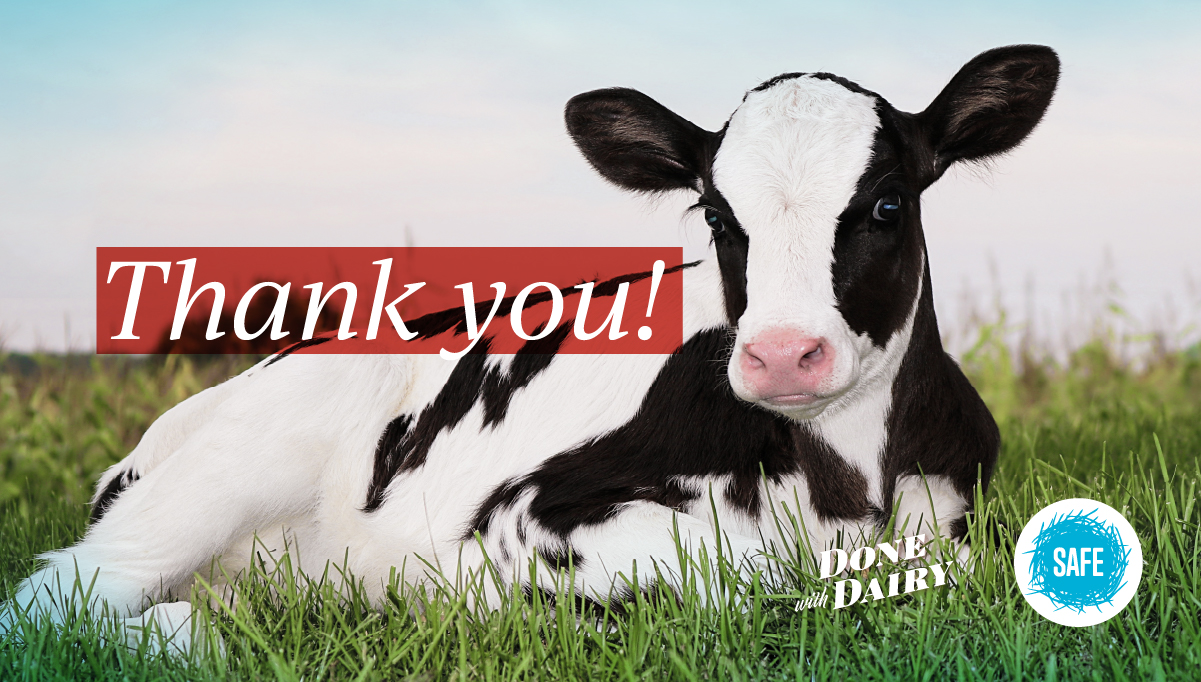Over 10,500 caring animal advocates spoke out against the cruel practice of foetal calf blooding and signed our open letter calling for a ban on the commercial slaughter of pregnant cows in Aotearoa.
Thank you for helping us shine a light on the malicious treatment of mother cows and calves by New Zealand’s meat and dairy industry. SAFE will continue to work tirelessly behind the scenes to ensure that mother cows are treated with dignity at every stage of life.

SAFE's open letter was published in the Dominion Post on Tuesday 27 September 2022, on behalf of over 10,500 animal advocates.
Foetal bovine serum (FBS) is made from the blood of unborn calves. FBS is used to help cells survive and grow during in vitro cell culture, including in the production of some vaccines, cell-based meats, and other biotechnology. Foetal calf blood is regarded as a ‘co-product’ of the meat and dairy industry. New Zealand primarily produces FBS to be exported overseas.
After a pregnant cow is killed, her unborn calf is removed from her body and taken to a separate room. The most common method used to collect blood is cardiac puncture – a needle is inserted into the calf’s heart without pain relief and their blood is drained. Calf blood is spun down to serum, sold to the biopharmaceutical industry and exported overseas. Export data indicates that at least 100,000 mother cows and calves are subjected to this every year in slaughterhouses across the country.
No. Foetal bovine serum is made from the blood of unborn calves, which involves killing mother cows during pregnancy. This is not ethical or humane, especially when there are animal-free alternatives readily available.
Serum is also made from newborn calves, bobby calves and adult cows, but foetal serum contains higher levels of growth-promoting factors and is more profitable for the industry. Foetal serum is more valuable and more widely used for its ability to facilitate rapid cell growth, and for its low levels of antibodies and other growth inhibiting factors.
While it is still widely used, there is a growing amount of serum-free media and human-derived alternatives to FBS, some of which have been shown to perform more effectively than FBS for cell survival and expansion. There are both ethical and scientific reasons why FBS should be replaced. Organisations in the Netherlands and the UK have developed the Fetal Calf Serum (FCS)-free database where professionals can find more information. Instead of growing the market for FBS, New Zealand should be researching and investing into innovative solutions to replace animal serum.
One of the most successful alternatives to FBS is human-platelet lysate (HPL). Made from human platelets, HPL has shown to be even more effective than FBS for its scientific applications, proving that we don’t need to harm animals in the name of science.
After a lifetime of being repeatedly impregnated, separated from their calves, and farmed for their milk, some mother cows are impregnated one last time before they’re sent to be killed. This is done so that the industry can profit from the blood of her unborn calf. Sick or injured cows are not allowed to be sent to slaughter, yet vulnerable cows can be transported and killed legally right up until their last month of pregnancy. This is an unnecessary final act of cruelty towards mother cows in Aotearoa.
It is currently still legal to kill cows during pregnancy, and cows can be legally transported until their final month of gestation. This can be extremely distressing for mother cows. We are calling on the National Animal Welfare Advisory Committee (NAWAC) to amend the Commercial Slaughter Code of Welfare to prohibit the killing of pregnant cows in Aotearoa, to better protect cows at every stage of their life.
Like humans, cows carry their pregnancies for nine months. Mother cows and calves form strong, loving bonds and given the opportunity, mother cows will feed, nurture and protect their calves until they are old enough to care for themselves. Sadly, intensive dairy production relies on the separation of mother cows and calves, a traumatic experience for the animals.
You can learn more about the cruelty behind dairy production and SAFE’s Done with Dairy campaign here.
Unfortunately, we will never know the true scale of suffering in this industry. The Ministry for Primary Industries does not find it necessary to record how many pregnant cows are being transported or killed within New Zealand. SAFE believes this should not be dismissed as standard practice.
Transport is inherently stressful for cows, and transport during pregnancy can increase their risk of suffering from heat stress, dehydration, injury, and early delivery. It is currently illegal for cows to give birth in transit or within 24 hours of arrival at a slaughter premise. However, farms have an economic incentive to send heavily pregnant cows to slaughter to get as much blood as possible from their unborn calves. In 2021, MPI issued 72 fines after cows gave birth on slaughterhouse floors, indicating that some farms are breaking the law to profit from mother cows when they are at their most vulnerable. A ban on the killing of pregnant cows would safeguard the welfare of mother cows and their calves, and require companies to pursue ethical alternatives to FBS.
After helping us call for a ban on the killing of pregnant cows, you can help us call for wider change by urging Government to create a clear plan of action which will support New Zealand farmers out of industrial dairy farming:
As a charity, SAFE is reliant on the support of caring people like you to carry out our valuable work. Every gift goes towards providing education, undertaking research and campaigning for the benefit of all animals. SAFE is a registered charity in New Zealand (CC 40428). Contributions of $5 or more are tax-deductible.
